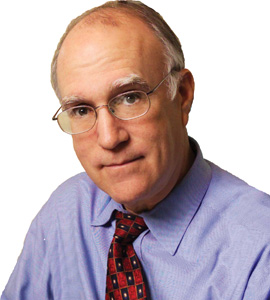Editorial
Front Page - Friday, June 4, 2010
I Swear...
The better to view and solve the puzzle
Vic Fleming

Awhile back, David Menz said to me that he was working the I Swear Crossword on an airplane when it occurred to him that it would be nice if the puzzle was positioned on the page so that you could see the whole thing when the paper is folded in half.
I could not but agree with Lawyer Menz on that point.
Thus, starting with the Friday, May 21, issue of The Daily Record, “I Swear” and the I Swear Crossword have been moved to page 4, specifically to accommodate this reasonable request from a consumer.
From that date forward, the puzzle should be fully showing after a middle-fold on the horizontal.
Ask and ye shall receive. Within reason.
Speaking of reason and crossword puzzles, last month I took a Wedensday off to speak to the Hot Springs National Park Rotary Club. The topic? You guessed it. Puzzles.
This was at the request of Lawrence Averill, former Dean of the William H. Bowen School of Law. Larry makes his home in Hot Springs these days. And continues to be an active Rotarian.
I must have owed Larry a favor, else, I’d never have caved in to his request. I treasure my Wednesdays in court (read on).
The Hot Springs club is a fair sized outfit. I’m guessing there were over a hundred folks in attendance.
Larry gave me a nice intro. The food was good. The equipment worked well. The talk was well received.
(And, since I had taken the day off anyway, I stopped on the way home and played a round of golf.)
So, what do I talk about when I give a civic club program on crosswords.
Well, I stress the facts that working puzzles is fun, and it is healthy.
Studies show that people who use their brain creatively in such activities as solving puzzles have the least incidence of Alzheimer’s Disease.
Will Shortz, puzzle editor of the New York Times and National Public Radio’s Puzzle Master, says, “Solving a crossword is the mental equivalent of going to the gym and working out on all the machines.”
Solving crosswords tests your vocabulary, your mental flexibility, your memory, your general knowledge, your sense of humor and your ability to perceive consistency, parallelism, similarities among words and phrases and much, much more.
Moreover, principles that apply in the solving of crosswords have direct applications in life as we know it.
For instance, lots of folks who solve puzzles regularly are surprised to learn that puzzles have themes: over-arching motifs executed by repetition of some common element.
Analogously, our lives have themes. Things that happen to us repeatedly are clues as to what our themes are.
I believe that a person who knows what his or her theme in life is can wield a competitive advantage over someone who doesn’t.
I believe also that the people whom we tend to call clueless are not clueless at all. They are themeless. Or, rather, unaware of the themes in their lives.
Also, I ask folks to visualize what parts of their lives are like puzzles.
On Wednesdays, I normally see 150-200 people in court. Each person has a traffic citation, a piece of paper with little boxes on it. As I visit with each defendant, the dialogue brings out the clues.
From those clues, I must write down the proper answers, and everything must jibe with applicable statutes and precedent.
It’s like solving dozens of puzzles, one right after the other.
(More next week.)
Vic Fleming is a district court judge in Little Rock, Arkansas, where he also teaches at the William H. Bowen School of Law. Contact him at vicfleming@att.net.
|
|